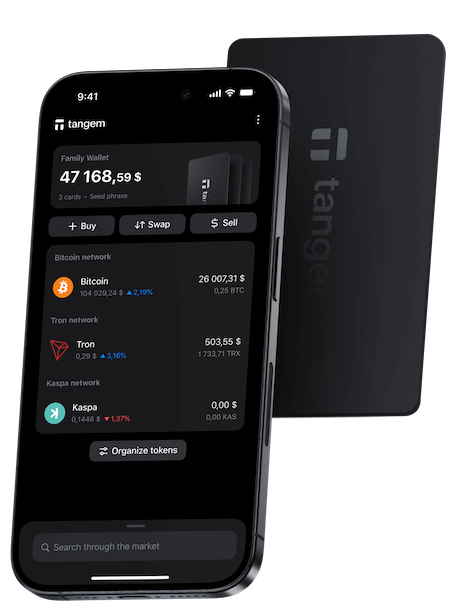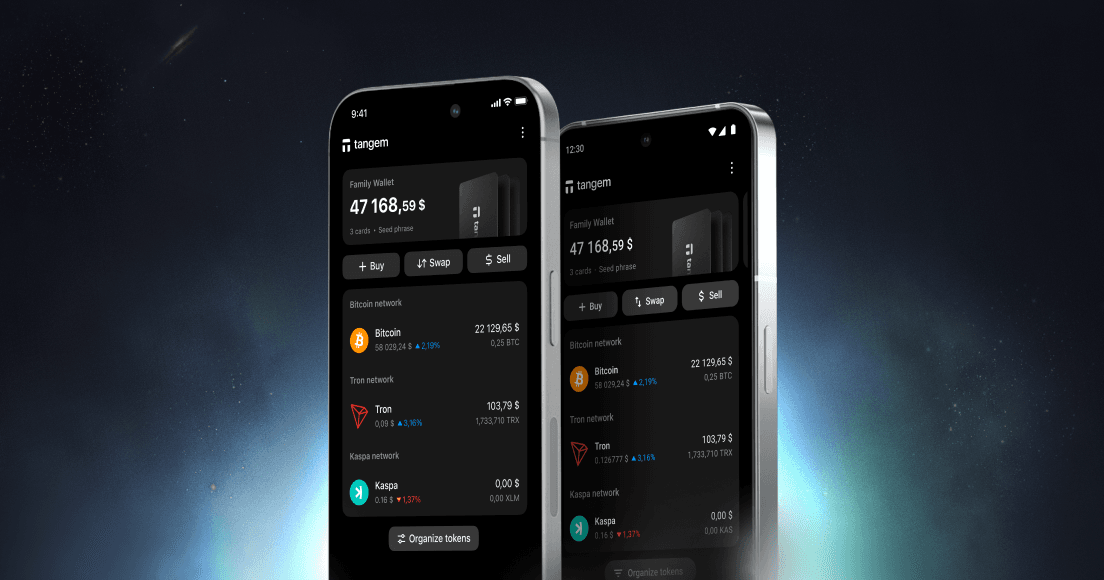
Nether wallet
The most secure hardware wallet for your Nether
Unlock security for your Nether with Tangem; join our satisfied global community!

How to secure your Nether with Tangem?
When you buy or hold Nether in Tangem, it secures your private keys in many ways:
- With the seedless setup and smart backups on extra devices, your Bitcoin is safe and accessible only to you.
- Tangem is IP69K water and dustproof, built to protect against extreme temperatures, EMPs, ESCs, and X-RAYS.
- An access code and biometric authentication protect against unauthorized access.
- Private keys are generated and stored on its EAL6+ CC secure element.
How to get a Nether Crypto Wallet?
Tangem products are for everyone, from beginners to experts. They keep your crypto safe and easy to manage. With cutting-edge technology, Tangem lets you control and protect your digital assets.
Get TangemWhy choose Nether wallet with Tangem.
What is Nether (NTR)?
Nether, also known as NTR, is an innovative platform in the NFT (non-fungible token) landscape, focusing on the value of human personality. It provides a marketplace where individuals, including well-known figures and influencers, can mint NFTs that embody their personal character traits. Enthusiasts and followers can trade these unique tokens, discovering the authentic worth of individual personality.
What is a Nether wallet?
A Nether wallet manages private keys, essential for accessing your Nether addresses. While it doesn't store NTR itself, as these reside on the blockchain, its primary role is to generate and secure these keys, allowing you to engage with and manage your Nether assets. Essentially, a Nether wallet is a tool for handling, transmitting, receiving, and overseeing your NTR tokens.
How does a Nether wallet work?
Nether wallets operate through the use of public and private key pairs to control blockchain accounts. The private key, necessary to access a specific Nether account, must remain confidential, while the public key can be shared to receive NTR. To move funds, the private key is essential. Tangem Wallet offers a solution by generating and protecting these keys within a secure chip.
What are the types of Nether wallets?
Exchange Nether Wallets:
Platforms like Coinbase and Binance allow trading of NTR with traditional currencies through custodial wallet solutions, but users risk potential access denial.Software Nether Wallets:
Downloadable apps for managing private keys and NTR tokens, yet vulnerable to cyber threats. Available for mobile, desktop, and browser.Mobile Nether Wallets:
Applications for handling NTR transactions on smartphones.Desktop Nether Wallets:
Software installed on PCs, storing private keys on local hard drives or SSDs.Hardware Nether Wallets:
Physical devices like Tangem that store keys offline, minimizing digital risks.
How to Choose the Best Nether Wallet
Selecting the right wallet depends on your unique requirements, emphasizing ease of use, dependability, resilience, and protection. For maximum security and larger holdings, a hardware wallet such as Tangem is a wise choice.

Tangem supports other cryptocurrencies
Reliability and convenience at your fingertips. Manage thousands of cryptocurrencies with peace of mind anywhere and anytime
See all supported cryptosNether FAQ
- For storing and using NTR, Tangem Wallet is a strong choice thanks to its offline key storage and mobile-friendly design.
- You can use most software wallets at no cost. Hardware wallets, which offer additional security, must be purchased separately. Network fees may still apply.
- The safest Nether wallet keeps your private keys offline and protected from unauthorized access. Hardware wallets, such as Tangem, offer the highest level of protection because they isolate keys from online risks.
- A Nether wallet is a tool that lets you store, send, and receive your digital assets. It manages your private keys, which prove ownership of your NTR.

